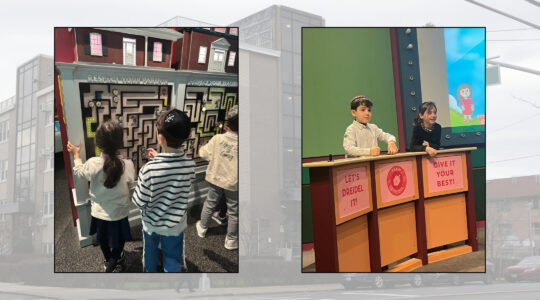San Francisco — Robert M., 58, worked for a news organization in the San Francisco Bay area until September 2008, when he lost his job in layoffs that eliminated 15 percent of the company’s workforce nationwide.
Robert had eight months of savings. They ran out in six months.
After 14 months of unemployment, in December 2009 Robert turned to San Francisco’s Jewish Family and Children’s Services for help with rent, utilities and, hardest of all, food.
“It was gut wrenching,” said Robert, who asked that his last name not be used. “I’d contributed a lot to charities over the years, including JFCS. My wife and I gave to the food bank regularly. Now we were on the other side.”
It sounds apocryphal: Former donors to a Jewish charity reduced to seeking help from that very same organization. But as more and more Jews are caught up in the recession, now two years running, food banks across the United States are reporting the same phenomenon. Middle-class Jews, professional Jews, young people with families — they’re out of work, their savings are gone, and they are showing up for help at Jewish social service agencies.
With unemployment extensions about to run out for many, the problem is expected to worsen.
“In addition to the poor and the working poor, which we’ve always served, there’s been a substantial increase the past 18 months among the middle and upper-middle class who are not in a position to make it, yet are not poor enough to get benefits” from government, said William Rapfogel, CEO and executive director of the Metropolitan Council on Jewish Poverty in New York.
Even so, the myth persists that Jews are affluent.
“There is denial of the degree of need in the Jewish community,” said Barbara Levy Gradet, executive director of Jewish Community Services in Baltimore. “We have young families as well as retired people looking for work. This is an equal-opportunity recession.”
The Met Council in New York, which serves the largest number of Jewish poor in the nation, distributes food packages at 60 sites in New York City’s five boroughs, part of the $3.5 million in food aid it gives out every year.
Fifteen thousand households receive the packages — up from 9,000 a year-and-a-half ago — and virtually all are Jewish. Whereas before the recession the Met Council saw a lot of haredi Orthodox families and the elderly, there has been a dramatic increase over the last two years in non-haredi Orthodox families and the non-observant, Rapfogel said.
One of the Met Council’s new clients is a 53-year-old grandmother who had an administrative job in a Jewish day school but was laid off in June 2009. She’s still collecting unemployment, which she supplemented a few times with food vouchers from the Met Council.
“I’m looking to work,” she told JTA. “I’m not looking to collect Medicaid or food stamps. It’s very hard when you have to depend on your children to help you. It’s not a good feeling.”
It’s impossible to know just how many Jewish poor there are in America. A 2004 study by the federation umbrella organization — now known as the Jewish Federations of North America — found 730,000 Jewish individuals, or about 15 percent of the country’s Jewish population, living in economic distress either below or slightly above the federal poverty standard. That was before the current recession.
The federal poverty guidelines themselves are woefully outdated, say many experts in the field. They are set at $10,830 annually for an individual and $22,050 annually for a family of four.
“Today, $10,000 does not seem livable,” said Joshua Protas, vice president and Washington director of the Jewish Council on Public Affairs.
The JCPA is working in Washington to prevent proposed cuts to the Supplemental Nutrition Assistance Program, or SNAP (formerly known as the federal Food Stamps program), as well as the child nutrition reauthorization bill, which provides 19.4 million children with free or subsidized school lunches, among other things.
“That includes a substantial Jewish population,” Protas said.
Ironically, the U.S. Senate recently passed its version of the bill that proposed funding in part by making additional cuts to SNAP. The JCPA is trying to head off similar cannibalization in the House of Representatives version of the bill.
In addition, the Washington office of the Jewish Federations is working to prevent a proposed 25 percent reduction in the Emergency Food and Shelter Program, which provides supplemental economic relief to millions of Americans through faith-based community programs and public providers. The cuts would be for fiscal year 2011, which begins Oct. 1.
But many Jews in desperate economic straits fall outside the purview of these federal programs. For them, the private Jewish charities are their only lifeline.
In Chicago, 42,000 people — 20 percent of the region’s Jewish population — received emergency food assistance through the Jewish United Fund/Jewish Federation of Metropolitan Chicago between June 2008 and July 2010. That represents a 24 percent increase from the previous two years.
In another twist, Jews in their 50s and early 60s are trying to access the agency’s older adult services program, which traditionally serves much older individuals.
San Francisco’s Jewish Family and Children’s Services, which serves about 65,000 mainly Jewish individuals a year, had one food pantry two years ago. Now the organization has five, one in each county it covers.
Executive director Anita Friedman says two-thirds of the program’s food clients signed up within the past year.
“There has always been a small group of chronically poor in our community, but the tsunami is the thousands who have recently lost their jobs,” she said. “Insurance, banking, finance, the tourist industry, anything related to real estate — all these have been really hurt.”
In Baltimore, Jewish Community Services helped 25,000 of the region’s 90,000 Jews over the past year with everything from food aid to employment assistance. The usual short-term programs of one or two months are no longer enough, Gradet says. Clients now need help for six months to a year.
In 2007, the organization spent $750,000 in housing and food assistance. In the past year it spent $1.2 million.
Gradet says former government workers — attorneys, money managers and other white-collar professionals — have been showing up asking for help.
Thankfully, say those in charge of these food programs, the Jewish community has stepped up to help out with donations and volunteering their time. In Baltimore, a recent half-million-dollar matching grant from a local donor was quickly matched by other contributions from the community. Other cities report similar gestures.
“The Jewish community is very sensitive to these issues and is very generous,” Friedman said. “It’s a blessing.”
The New York Jewish Week brings you the stories behind the headlines, keeping you connected to Jewish life in New York. Help sustain the reporting you trust by donating today.




